商学部(塾外用) - 慶應義塾大学-塾生HP
商学部(塾外用) - 慶應義塾大学-塾生HP
商学部(塾外用) - 慶應義塾大学-塾生HP
You also want an ePaper? Increase the reach of your titles
YUMPU automatically turns print PDFs into web optimized ePapers that Google loves.
Whole lecture is divided into two parts: in part 1, each lecture will be<br />
based on different chapters of Gilson (2000) and in part 2, the national<br />
economy of EU countries and its relations with Japan will be discussed.<br />
Related statistics and case studies are also introduced in both parts.<br />
In each lecture, Powerpoint will be used for exposition.<br />
As it is expected to be a small class, composed of Japanese and non-<br />
Japanese students, active questions and comments by students are<br />
welcome.<br />
Students are supposed to submit a report on one of the questions based<br />
on each lecture and submit it at the beginning of the next lecture.<br />
Textbooks:<br />
Gilson, Julie, Japan and the European Union A partnership for the<br />
Twenty-First Century?, Palgrave Macmillan, 2000 (Several Copies of the<br />
text are on reserve at the library.)<br />
Reference Books:<br />
Kaji, Kokusai tuuka taisei-no keizaigaku, Nikkei, 2004<br />
AFRICAN ISSUES: THE MEANING OF MODERNITY AND<br />
CRISES IN AFRICA 2credits (Spring)<br />
アフリカン イシューズ:アフリカにおける近代と危機の意味<br />
2単位 (春学期)<br />
Struggling in an African City: the Exploration of a Life and Magical<br />
Practice amidst Uncertainty<br />
Lecturer KONDO, HIDETOSHI<br />
講師 近藤 英俊<br />
Course Description:<br />
Children, who are emaciated with protruding bellies and fly-infested<br />
faces, are crying for food, or worse, already motionless in their mothers’<br />
arms. For many, such a shocking scene is typically associated with Africa.<br />
This popular imagery has its origin in mass media that are often<br />
sensationalistic as to African coverage. The truth is that Africa is the<br />
continent of wonderfully rich and diverse cultures, where people live their<br />
vibrant everyday life. Yet, from this, it does not immediately follow that<br />
Africa is a trouble-free region. Just as Japan and other industrial countries<br />
have many social problems, Africa does have critical issues to be pursued.<br />
This course is intended to explore some of the major problems that<br />
Africa is currently facing. This year we will focus on the critical aspects<br />
of the lives of people in an African city and the significance of magical<br />
practices in comprehending and controlling their crises. Of many changes<br />
Africa has undergone since the beginning of colonial period particularly<br />
remarkable are the acceleration of movement of people, commodities and<br />
knowledge, the multiplication of social identities and negotiation over<br />
cultural meanings and values. These changes find the clearest expression<br />
in the cities that owe their phenomenal growth largely to migrants and yet<br />
lack the forces to systematically control their lives. Industrial capitalism<br />
as well as rationalized state bureaucracy being underdeveloped, they<br />
manage their lives in continuous flux of cultures and social relations;<br />
during the course of action, they tend to encounter multitude of various<br />
and often hitherto unknown interpretations, knowledge and persons and to<br />
try those that happen to appear to fit their situations ‘here and now’. Their<br />
actions are often at the mercy of luck. It is in this realm of contingency<br />
and possibility (uncertainty) where one should understand the crises of the<br />
city dwellers and their coping strategies including their frequent use of<br />
magical practices in Africa.<br />
Thus, based on the field research in the city of Kaduna, a city known for<br />
its extreme cultural diversity in Nigeria, the course will make an in-depth<br />
analysis of the above issues by closely examining the crises of several<br />
individuals and the magical practices of traditional healers living in the<br />
city.<br />
Textbooks:<br />
Texts will be distributed in due course.<br />
Reference Books:<br />
The list of suggested readings will be distributed in due course.<br />
84<br />
BUILDING THE GLOBAL VILLAGE 2credits (Fall)<br />
グローバルヴィレッジ構築に向けて 2単位 (秋学期)<br />
Japanese Policies in Southern Africa:<br />
Trans-National Issues and Individual Response-<br />
The Consumer as Participant in Development Policy<br />
Professor, Faculty of Environment and Information Studies<br />
FREEDMAN, DAVID J.<br />
環境情報学部教授 フリードマン, デビッド J<br />
Course Description:<br />
In an increasingly connected world, there are no specialty areas.<br />
Integration into a growing global economy encompasses both economic<br />
and trans-economic issues. At the Davos World Economic Forum 2001,<br />
the term “culturnomics” was coined to define how various intellectual<br />
disciplines needed to be combined in order to gain a more complete view<br />
of the issues facing a “global” economy. This course will focus on a<br />
particular area, Sub-Saharan Africa and the various issues: political.<br />
cultural, economic and environmental, that the people of this region face<br />
as they look to integrate into the “global village.” Speakers from the<br />
various embassies of the region will be invited to speak on the theme of<br />
global economy, culture and change and the impact of Japanese policies<br />
within the region.<br />
As the countries of sub-Saharan Africa attempt to formulate policies in<br />
areas such as HIV care and education, sustainable development, conflict<br />
management and the growth of open societies, these policies connect with<br />
similar policies and issues around the world. Japan has made aid for<br />
African nations and support for the New Partnership for Africa's<br />
Development a major part of its international policy. In 2004, Japanese<br />
Prime Minister Junichiro Koizumi pledged $1 billion for education and<br />
health care in Africa making Japan one of the major aid donors for<br />
Africa. Next year at the fourth Tokyo International Conference on<br />
African Development these efforts will face an renewed evaluation. (http://<br />
www.jica.go.jp/english/resources/field/2007/aug30.html) Yet, there is an<br />
"information gap" between the policies and intents of the Japanese<br />
government and business community and the response and knowledge of<br />
the Japanese citizen as to the recent history, the varied cultures and issues<br />
in Africa today, and the goals and effects of the Japanese policies<br />
themselves.<br />
This course will be an introduction for students interested in issues<br />
affecting global governance and Africa. Through a series of lectures<br />
offered by ambassadors and embassy officials from the S.A.D.C. group,<br />
(http://www.mbendi.co.za/orsadc.htm) students will explore the variety of<br />
links diplomatic, educational, economic and cultural that tie Japan to<br />
contemporary Africa, and the possibilities of active response by the<br />
individual Japanese consumer.<br />
Each student will be expected to join a study group that will focus one<br />
of the African countries represented by the speakers. The groups will<br />
research and present on the ties and programs between their “study”<br />
country and Japan on the focus issue of the course. This year, the focus<br />
will be on the individual consumer as an active participant in development<br />
policies.<br />
Reference Books:<br />
http://www.mbendi.co.za/orsadc.htm * this site is required viewing<br />
before the second meeting!<br />
http://allafrica.com/<br />
http://www.bespokeexperience.com/en/1/home.mxs ethical tourism<br />
African Health Resources<br />
http://www-sul.stanford.edu/depts/ssrg/africa/health.html<br />
Student “internships”<br />
http://southafricacommunityfund.org/ap/intern.asp



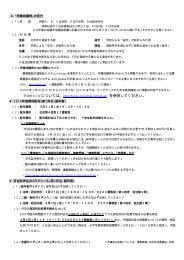
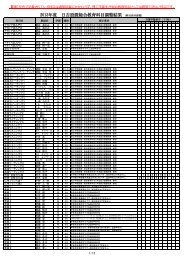
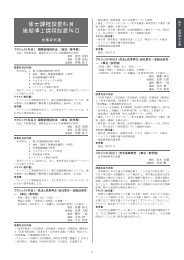
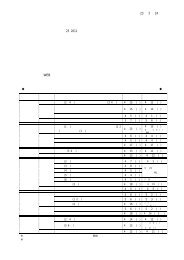
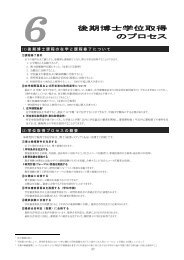
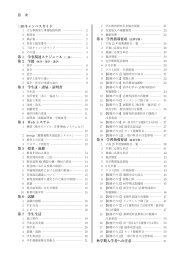



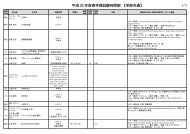

![文学部時間割表[2 ・3年生(07学則)]](https://img.yumpu.com/21046130/1/184x260/2-307.jpg?quality=85)

